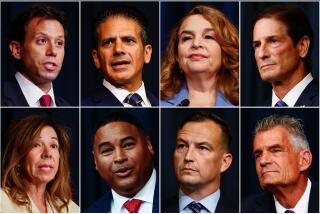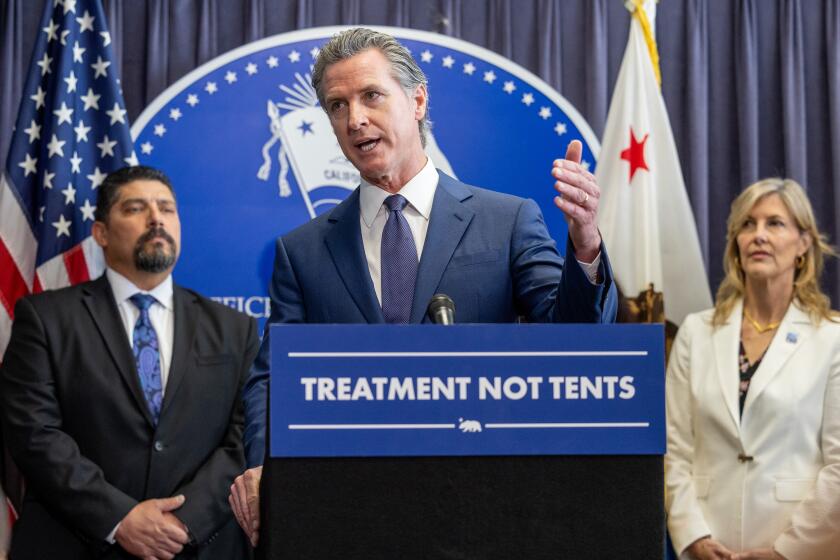San Diego D.A. reclaims cases from Los Angeles in latest fight over George Gascón’s policies

In an unprecedented move, a judge allowed the San Diego County district attorney’s office to move to reclaim jurisdiction Monday over several charges filed in Los Angeles connected to a violent crime spree that left two people dead, marking one of the strongest rebukes yet of newly elected L.A. County Dist. Atty. George Gascón’s policies.
In a motion filed last week, San Diego County Dist. Atty. Summer Stephan asked a judge to give her office control over five robbery counts filed against Rhett Nelson, 31, part of a broader slate of charges he faces for his alleged role in a days-long crime spree that spanned across Southern California and left two people dead in 2019, including Los Angeles County Sheriff’s Deputy Joseph Solano.
Nelson was charged with two counts of murder, one count of attempted murder and seven robberies committed in or near San Diego, Long Beach and Los Angeles. Under previous Dist. Atty. Jackie Lacey, a slew of sentencing enhancements were also filed against Nelson because he allegedly used a gun in each crime and is charged with multiple murders. If convicted under those terms, he would have been sentenced to life in prison without the possibility of parole.
Stephan had agreed to consolidate all charges in Los Angeles, but changed her mind in response to Gascón’s directive barring prosecutors from using enhancements. According to her filing, Stephan feared Nelson could become eligible for parole after spending 20 years in prison if convicted without enhancements.
Greg Risling, a spokesman for the Los Angeles County district attorney’s office, disputed Stephan’s math late Monday, saying Nelson could face up to 68 years in state prison if convicted on all charges he currently faces.
Superior Court Judge Jose Sandoval agreed that Stephan could reclaim jurisdiction. A technical issue over how to sever the cases must still be resolved, but San Diego prosecutors plan to file robbery charges in their jurisdiction soon, according to a spokeswoman for Stephan’s office.
Sandoval also blocked an attempt to dismiss the special circumstances enhancement against Nelson on Monday, which he faced for the alleged commission of multiple murders. Sandoval’s decision echoed several other judges who have blocked such dismissals under Gascón’s directive, unless prosecutors can produce additional evidence that the circumstances of the case have changed.
Given the severity of the crimes Nelson is accused of, the odds of him receiving parole are unlikely. But San Diego County Deputy Dist. Atty. Martin Doyle, who appeared in court Monday, said Nelson was too dangerous to leave even the possibility of parole on the table.
“He’d serve only 20 years before he has his first parole hearing. We don’t think that’s appropriate. We want to make sure that he serves the rest of his life in prison,” Doyle said. “I can’t say what a parole board will do 20 years from now.”
Doyle also expressed concern that Gascón’s order to bar prosecutors from opposing release at parole hearings could make it easier for Nelson to be set free in the future.
Sacramento County Dist. Atty. Anne Marie Schubert also said Monday she would not grant jurisdiction to Gascón in any cases like Nelson’s, where charges could be consolidated, claiming many of his new policies are “illegal and unconstitutional,” according to a copy of the letter obtained by The Times.
“District Attorney Gascón’s policy of eliminating life without the possibility of parole enables future generations to determine whether it is in the public’s interest to continue to incarcerate older individuals at extraordinary taxpayer expense who do not pose a threat to public safety,” Risling said in response to Monday’s events.
Nelson disappeared from his family’s home in St. George, Utah, in May 2019 after telling his relatives he needed to “make it on his own or die.” He allegedly robbed five convenience stores at gunpoint in San Diego during a two-day stretch in early June before traveling north, court records show.
On June 10, police say he drove up to a group of skateboarders in downtown Los Angeles and opened fire at random, killing Dmitry Koltsov, a champion Russian snowboarder who had moved to California. An hour later, police say he walked up behind Solano in a Jack in the Box restaurant in Alhambra and shot the veteran deputy in the head.
Investigators have never disclosed a motive in either attack, though at the time, it did not appear Nelson knew Solano was a law enforcement officer. Solano — who has been remembered as a devout family man and was running an errand for his mother the night he was shot — died two days later.
During an emotional hearing on Monday morning, several of Solano’s loved ones spoke out in support of the efforts of San Diego prosecutors’ efforts while lambasting Gascón.
The deputy’s son, Matthew Solano, referred to his father’s death as a “life sentence” and said Nelson deserved nothing short of that punishment, later adding that the case is a “prime example of how [Gascón’s] blanket reforms benefit dangerous criminals.”
At one point during the hearing, Nelson stood up and said he would “accept the maximum penalty” and repeatedly asked the court to allow him to speak, over admonitions from Sandoval and his attorney. Nelson shouted an apology to Solano’s family while he was escorted out of the courtroom, but his outburst drew a furious reaction from Solano’s son.
Gascón announced a number of dramatic shifts to long-established policy when he took office in early December, including banning the use of the death penalty, barring prosecutors from trying juveniles as adults and setting the stage to end the use of cash bail in the nation’s largest court system. But his policy blocking the use of enhancements has met the broadest pushback from judges, his own prosecutors and the families of crime victims, all of whom have questioned the legality and ethics of the move.
After announcing the blanket ban on all enhancements, Gascón relented somewhat under intense pressure and decided to allow for the use of enhancements in extreme cases, including hate-motivated attacks and instances of violence against children.
Gascón and his supporters have repeatedly pointed to research that shows enhancements disproportionately affect Black and Latino communities and have questioned whether they serve any public safety purpose. Gascón has argued that sentences for underlying crimes already give prosecutors the ability to seek appropriate sentences, and his transition team has highlighted data that show roughly 90% of defendants from L.A. County sent to prison under sentencing enhancements were people of color.
More to Read
Start your day right
Sign up for Essential California for news, features and recommendations from the L.A. Times and beyond in your inbox six days a week.
You may occasionally receive promotional content from the Los Angeles Times.







